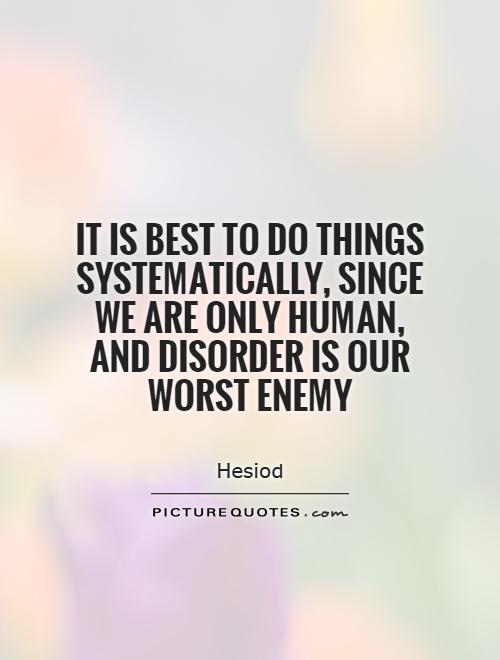It is best to do things systematically, since we are only human, and disorder is our worst enemy

It is best to do things systematically, since we are only human, and disorder is our worst enemy
In the works of Hesiod, a Greek poet and philosopher from the 8th century BC, the importance of order and systematic approach to life is a recurring theme. Hesiod believed that humans are inherently flawed and prone to chaos and disorder, and that the only way to combat this inherent weakness is to approach tasks and challenges in a systematic manner.Hesiod's most famous work, "Works and Days," is a didactic poem that offers advice on how to live a virtuous and successful life. In this poem, Hesiod emphasizes the importance of following a systematic approach to work and life in order to achieve success and avoid the pitfalls of disorder and chaos. He believed that disorder is the worst enemy of humans, as it leads to confusion, inefficiency, and ultimately failure.
Hesiod believed that by following a systematic approach to work and life, humans can overcome their inherent weaknesses and achieve greatness. He believed that by setting goals, creating a plan, and following a step-by-step process, humans can achieve success in their endeavors. Hesiod also believed that by following a systematic approach, humans can avoid the temptations of laziness, procrastination, and distraction that often lead to disorder and chaos.
Hesiod's emphasis on order and systematic approach to life is also reflected in his views on justice and morality. He believed that by following a systematic approach to justice and morality, humans can create a harmonious and just society. Hesiod believed that by following the laws of the gods and living a virtuous life, humans can avoid the chaos and disorder that often lead to conflict and suffering.












 Friendship Quotes
Friendship Quotes Love Quotes
Love Quotes Life Quotes
Life Quotes Funny Quotes
Funny Quotes Motivational Quotes
Motivational Quotes Inspirational Quotes
Inspirational Quotes